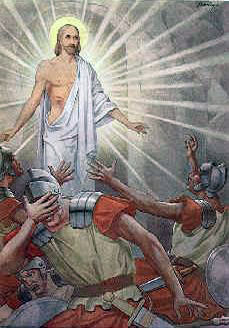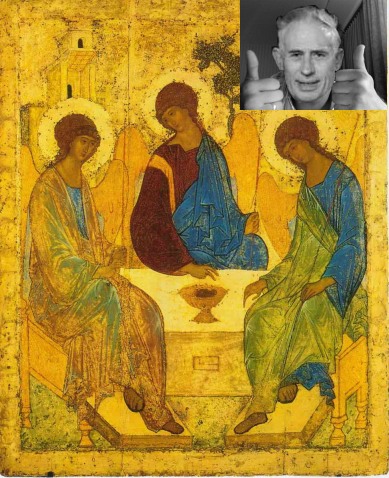Origen, Paul, and Peter: Christians worship the Jews’ god
An interesting little exchange between Origen and the pagan critic Celsus about the god of Christians.
An interesting little exchange between Origen and the pagan critic Celsus about the god of Christians.
 As Joseph explained in his last post, in his On the Trinity, Richard of St. Victor asserts the superiority of “shared love” (Latin: condilectus). He holds that it is superior to other loves in value and in the pleasure it involves. He’s imagining something like my chart on the left.
As Joseph explained in his last post, in his On the Trinity, Richard of St. Victor asserts the superiority of “shared love” (Latin: condilectus). He holds that it is superior to other loves in value and in the pleasure it involves. He’s imagining something like my chart on the left.
Look at the bottom case, and how the love arrows combine; this seems to be what Richard is imagining (see the quote in the last post). I don’t think it’s coherent, really – affections, or individual love-acts can’t literally fuse. Nor do I understand any non-literal way they can be said to “fuse”.
Still, I’m inclined to agree with Joseph and with Richard Swinburne that there is a unique value in lovers cooperating to love a third party. This is something we recognize, I think, in Mom and Dad’s love for junior, or even in “best friends” graciously including an excluded girl within their circle.
Further, I think Richard of St. Victor is right that there is a relational harmony and cooperation in such cases, and a unique sort of pleasure all around.
Whether this value would provide a perfect person with a compelling reason to create mysteriously originate at least two other divine persons is a further matter.
In chapter 20, Richard makes clear that my chart here is too simple – there should be aRead More »Richard of St. Victor’s De Trinitate, Ch. 20 (Dale)
 In the preceding chapters, Richard has been arguing for the impossibility of only one divine person. If there’s one, there must be more than one; more than that, there must be at least three.
In the preceding chapters, Richard has been arguing for the impossibility of only one divine person. If there’s one, there must be more than one; more than that, there must be at least three.
To do this, he’s used Anselmian perfect being theology – arguing that since God is absolutely perfect, and it would add to his perfection to have certain features, he must indeed have those. It seems that he prefers a three parallel arguments, from perfect goodness, perfect happiness, and perfect glory. (See, e.g. chapter 5.)
As the book goes on, though, it seems to me that he prefers the argument from happiness. Here, in chapter 21, he sums up his case, because he feels some pressure here at the end of the book to explain why all this should be considered monotheism, and not polytheism. More on that next time. Here’s what looks like his summary of his argument:
The fullness of supreme happiness requires fullness of supreme pleasure. The fullness of supreme pleasure requires fullness of supreme charity. The fullness of supreme charity demands fullness of supreme perfection. (p. 393)
This last part isn’t easy to see, but as we’ve been over it, I let it go here. In chapter 21, Richard assumes that perfect being reasoning should be applied to each member of the Trinity. If we do this, then we prove the existence of equally perfect beings, such that “all coincide in supreme equality. In all of them there will be equal wisdom, equal power, undifferentiated glory, uniform goodness, and eternal happiness…” (pp. 393-4, emphasis added)
This, he asserts, meets the requirement of the “Athanasian” creed,Read More »Richard of St. Victor’s De Trinitate, Ch. 21 (Dale)
Which parts of Channing’s thought do and don’t hold up today?

Of all the ancient catholic “fathers” I’ve read, Origen (c.185-254) is the most impressive as a scholar.
It’s not that I usually agree with him – any non-Platonist is going to choke on many of the dishes he’s serving, and I think that most today would take issue with some his ways of interpreting the Bible. But he has vast knowledge, he makes pretty careful distinctions, he knows how to argue, and is just a much more developed and original thinker than most. Any contemporary who was going to square off with him either did or should have considered him a formidable opponent.
He wrote, or rather dictated, a vast amount – evidently, he did little else. Some think he may have been the most prolific person in antiquity. We still have a fair number of texts from him.
He’s historically important for many reasons, but for this post, what’s most important is that in the 3rd century he was considered a stalwart of mainstream (“catholic”, or “proto-orthodox”) Christianity.
Lately I’ve been reading Origen’s Commentary on John, as translated by Ronald E. Heine, who by way, I have found very helpful. He too is a first-rate scholar.
Evidently, passage here is directed against certain monarchians who thought (or at least, were alleged to think) that the Father = the Son, i.e. that the Son is the Father himself and vice versa. This passage struck a nerve with me, as it reminded me of conversations I’ve had.
The references in brackets are from Heine’s footnotes.Read More »Origen: the Son is not the Father
I’ve been working on my Trinities book today, and have been reading a lot of Origen (d. c. 253) lately. As is well known, most of his famous On First Principles (kindle, hardback) has been lost in the original Greek, but we have a “complete” copy of a Latin translation made by Rufinus of Aquileia (d. 410) in 398-9. Unfortunately, this translation was made in… Read More »Rufinus’s corruption of Origen’s On First Principles – Part 1
 Against Celsus is not the only important surviving book by Origen. Origen’s On First Principles is often called the first systematic Christian theology. It was written some time before 231. It is a bold and wide-ranging work, and in Origen’s day Christian theologians could speculate a fair amount.
Against Celsus is not the only important surviving book by Origen. Origen’s On First Principles is often called the first systematic Christian theology. It was written some time before 231. It is a bold and wide-ranging work, and in Origen’s day Christian theologians could speculate a fair amount.
But the curtain was brought down on this era of freedom by ecclesial-political events of the fourth century. While many still considered Origen a great scholar, the atmosphere was such that one might lose one’s church career if people thought you were too sympathetic to his views.
Among his admirers was the great scholar Jerome (translator of the Latin Vulgate Bible), but Jerome had do distance himself from Origen lest the heresy hunters get him. But still, people wanted to read Origen. Answering this need, Rufinus (d. 410) translated Origen’s On First Principles into Latin. Problem is, Rufinus systematically cut out and/or changed numerous passages that would not fit the new Pro-Nicene hegemony.
How do we know this? Because Rufinus tells us! He argues that heretics must have corrupted Origen’s works, since there just could not be a difference between those and the new catholic orthodoxy. Also, we have from other sources, e.g. letters of his contemporaries, the Greek texts of some of the cut and altered passages. In the excellent modern edition of the book, the editor-translator restores these to the text. Sadly, Rufinus’s Latin version is the only complete version we have of Origen’s book, so as it stands, the book is riddled with suspicious passages that don’t fit what we otherwise know about Origen, but which we have no textual grounds to correct. (On the whole crazy affair, see the above edition, pp. xxxi-lii.)
Here are some of the cut and restored passages; if you’re familiar with the “Arian” controversy and the trinitarian orthodoxy that coalesced and acquired the power of the Roman emperor at the end of the fourth century, you will not need an explanation why Rufinus cut them.
…the Saviour… is an image of God’s goodness, but Read More »trinitarian or unitarian? 7 – Origen uncensored
How many times have you seen one of these offered as an explanation or illustration of the doctrine of the Trinity? There’s a good article about these here, complete with some links to real medieval examples. Basically, this sort of Shield of Faith (Latin: scutum fidei) diagram seems to have originated in the high middle ages, with the intention of illustrating the doctrine. In general,… Read More »Ye Olde Trinity Diagram: The Shield of Faith
Chad occasionally talks in ways that suggest that I’ll actually alleging divine deception.
A narrative of the series of early speculations that eventually led to the idea of the Trinity as the one God.
Is it obvious that the cause must temporally precede the effect?
Closing statements: Finnegan: 1:48:43- 1:52:12 Only one Yahweh. Jesus does things God says he can’t do, e.g. die. Jesus affirms Shema. In John 10, Jesus uses a concept of “representational deity” – i.e. calling a being who isn’t God “God” because of some likeness to God in some respect(s). Trinity is confusing, post-biblical. But it is a solution to a non-existent problem, namely, of their… Read More »Trinitarian-Unitarian Debates – 1 Bosserman vs. Finnegan, 2008 – Part 5
“When the LORD finished speaking to Moses on Mount Sinai, he gave him the two tablets of the Testimony, the tablets of stone inscribed by the finger of God.” Ex. 31:18 Once upon a time, there was a smallish branch of Christians, now nearly forgotten to history, called the Fingerites, inhabitants of Obscurantia (formerly part of the Roman Empire). Although they put their point in… Read More »Dealing with Apparent Contradictions: Part 16 – Mysterious Interpretations
In recent posts here and here my co-blogger and friend arch-nemesis Chad McIntosh has tried his hand at refuting my Divine Deception argument. I’ve already responded to numerous tries to get around it by my friend Bill Hasker here and here. But to his credit, Chad is thinking creatively and coming at it from some new angles. First, it’s important to be be clear about the… Read More »“Divine Deception” Defended
“I do not know what the Christians mean, and am as much puzzled as you; but Father Verbiest is of that opinion.”
 Let’s pretend that this shows Jesus at the age of 3 months. Does the New Testament teach that no more than 12 months before, Jesus came into existence (for the first time), that is, in philosopher’s lingo, that he was generated?
Let’s pretend that this shows Jesus at the age of 3 months. Does the New Testament teach that no more than 12 months before, Jesus came into existence (for the first time), that is, in philosopher’s lingo, that he was generated?
Sir Anthony Buzzard has argued that the New Testament teaches exactly that, and explicitly so. There’s been a boiling discussion of this argument by our intrepid commenters on this post.
I think this issue deserves some posts. In the past I’ve never been sure I’ve quite understood his argument, and so have never taken a position on it. I’m going to think through it in this series of posts.
Let us first note that the truth and reasonableness of this humanitarian unitarian christology doesn’t stand or fall with this exegetical argument. There may be other textual, theological, or philosophical reasons to hold that Christ did not exist before his human life, i.e. before his conception. It is clear to me, in fact, that this argument is not Sir Anthony’s only reason for this view. (See e.g. comment #2 in the discussion linked above.)
Second, let’s note that it is a very strong or bold argument. Read More »Buzzard’s textual arguments against Jesus’ pre-human existence – Part 1
Time for mutual interrogations! This is the best part of this debate.
Finnegan questions Bosserman: 1:24:35 – 1:36:19
“I believe in the divinity of Christ.” Perfect. Like a Rorschach test, people can read it however they want.
V.V. Raman is an emeritus professor of Physics at the Rochester Institute of technology, and has written a number of works on science and religion, his Indian heritage, and other subjects relating to the history of science, and the relation of the sciences to the humanities. Also, he’s a poet. Watch his interview by Dr. Robert Lawrence Kuhn here (click the blue button) and read… Read More »Is God a Self? Part 5 – Varadaraja V. Raman

Swinburne sez: Two thumbs up for the social analogy!
Richard Swinburne is an Emeritus professor at Oriel College, Oxford University, and is widely considered one of the greatest living Christian philosophers. He’s done original work in philosophy of science, epistemology, philosophy of mind, and general metaphysics, but is perhaps best known for his work in philosophy of religion and philosophical theology. He has a way of squarely facing tough issues, and treating them in original and principled ways. He’s particularly well known by philosophers for his arguments for mind-body dualism, for his cumulative case for the existence of God, and for his bold social trinitarian theory, which I’ll cover in this series. Read More »Swinburne’s Social Trinitarian Theory, Part 1